您好,登录后才能下订单哦!
今天就跟大家聊聊有关Kubernetes的资源指标API及自定义指标API是什么,可能很多人都不太了解,为了让大家更加了解,小编给大家总结了以下内容,希望大家根据这篇文章可以有所收获。
以前是用heapster来收集资源指标才能看,现在heapster要废弃了
从1.8以后引入了资源api指标监视
资源指标:metrics-server(核心指标)
自定义指标:prometheus,k8s-prometheus-adapter(将Prometheus采集的数据转换为指标格式)
k8s的中的prometheus需要k8s-prometheus-adapter转换一下才可以使用
新一代架构:
核心指标流水线:
kubelet,metrics-service以及API service提供api组成;cpu累计使用率,内存实时使用率,pod的资源占用率和容器磁盘占用率;
监控流水线:
用于从系统收集各种指标数据并提供终端用户,存储系统以及HPA,他们包括核心指标以及很多非核心指标,非核心指标本身不能被k8s解析
复制代码
第二章、安装部署metrics-server
1、下载yaml文件,并安装
项目地址:https://github.com/kubernetes/kubernetes/tree/master/cluster/addons/metrics-server ,选择与版本对应的分支,我的是v1.10.0,所以这里我选择v1.10.0分支
[root@k8s-master_01 manifests]# mkdir metrics-server [root@k8s-master_01 manifests]# cd metrics-server [root@k8s-master_01 metrics-server]# for file in auth-delegator.yaml auth-reader.yaml metrics-apiservice.yaml metrics-server-deployment.yaml metrics-server-service.yaml resource-reader.yaml;do wget https://raw.githubusercontent.com/kubernetes/kubernetes/v1.10.0/cluster/addons/metrics-server/$file;done #记住,下载raw格式的文件 [root@k8s-master_01 metrics-server]# grep image: ./* #查看使用的镜像,如果可以上外网,那么忽略,如果不可用那么需要提前下载,通过修改配置文件或修改镜像的名称的方式加载镜像,镜像可以到阿里云上去搜索 ./metrics-server-deployment.yaml: image: k8s.gcr.io/metrics-server-amd64:v0.2.1 ./metrics-server-deployment.yaml: image: k8s.gcr.io/addon-resizer:1.8.1 [root@k8s-node_01 ~]# docker pull registry.cn-hangzhou.aliyuncs.com/criss/addon-resizer:1.8.1 #手动在所有的node节点上下载镜像,注意版本号没有v [root@k8s-node_01 ~]# docker pull registry.cn-hangzhou.aliyuncs.com/k8s-kernelsky/metrics-server-amd64:v0.2.1 [root@k8s-master_01 metrics-server]# grep image: metrics-server-deployment.yaml image: registry.cn-hangzhou.aliyuncs.com/k8s-kernelsky/metrics-server-amd64:v0.2.1 image: registry.cn-hangzhou.aliyuncs.com/criss/addon-resizer:1.8.1 [root@k8s-master_01 metrics-server]# kubectl apply -f . [root@k8s-master_01 metrics-server]# kubectl get pod -n kube-system
2、验证
[root@k8s-master01 ~]# kubectl api-versions |grep metrics metrics.k8s.io/v1beta1 [root@k8s-node01 ~]# kubectl proxy --port=8080 #重新打开一个终端,启动代理功能 [root@k8s-master_01 metrics-server]# curl http://localhost:8080/apis/metrics.k8s.io/v1beta1 #查看这个资源组包含哪些组件 [root@k8s-master_01 metrics-server]# curl http://localhost:8080/apis/metrics.k8s.io/v1beta1/pods #可能需要等待一会在会有数据 [root@k8s-master_01 metrics-server]# curl http://localhost:8080/apis/metrics.k8s.io/v1beta1/nodes [root@k8s-node01 ~]# kubectl top node NAME CPU(cores) CPU% MEMORY(bytes) MEMORY% k8s-master01 176m 4% 3064Mi 39% k8s-node01 62m 1% 4178Mi 54% k8s-node02 65m 1% 2141Mi 27% [root@k8s-node01 ~]# kubectl top pods NAME CPU(cores) MEMORY(bytes) node-affinity-pod 0m 1Mi
3.注意事项
1.#在更新的版本中,如v1.11及以上会出现问题,这是因为metric-service默认从kubernetes的summary_api中获取数据,而summary_api默认使用10255端口来获 取数据,但是10255是一个http协议的端口,可能官方认为http协议不安全所以封禁了10255端口改为使用10250端口,而10250是一个https协议端口,所以我们需要修改一下连接方式: 由 - --source=kubernetes.summary_api:'' 修改为 - --source=kubernetes.summary_api:https://kubernetes.default?kubeletHttps=true&kubeletPort=10250&insecure-true #表示虽然我使用https协议来通信,并且端口也是10250,但是如果证书不能认证依然可以通过非安全不加密的方式来通信 [root@k8s-node01 deploy]# grep source=kubernetes metrics-server-deployment.yaml 2.[root@k8s-node01 deploy]# grep nodes/stats resource-reader.yaml #在新的版本中,授权文内没有 node/stats 的权限,需要手动去添加 [root@k8s-node01 deploy]# cat resource-reader.yaml apiVersion: rbac.authorization.k8s.io/v1 kind: ClusterRole metadata: name: system:metrics-server rules: - apiGroups: - "" resources: - pods - nodes - nodes/stats #添加这一行 - namespaces 3.在1.12.3版本中测试发现,需要进行如下修改才能成功部署(权限依然需要修改,其他版本暂未测试) [root@k8s-master-01 metrics-server]# vim metrics-server-deployment.yaml command: #metrics-server命令参数修改为如下参数 - /metrics-server - --metric-resolution=30s - --kubelet-port=10250 - --kubelet-insecure-tls - --kubelet-preferred-address-types=InternalIP command: #metrics-server-nanny 命令参数修改为如下参数 - /pod_nanny - --config-dir=/etc/config - --cpu=40m - --extra-cpu=0.5m - --memory=40Mi - --extra-memory=4Mi - --threshold=5 - --deployment=metrics-server-v0.3.1 - --container=metrics-server - --poll-period=300000 - --estimator=exponential
第三章、安装部署prometheus
项目地址:https://github.com/kubernetes/kubernetes/tree/master/cluster/addons/prometheus(由于prometheus只有v1.11.0及以上才有,所有我选择v1.11.0来部署)
1.下载yaml文件及部署前操作 [root@k8s-node01 ~]# cd /mnt/ [root@k8s-node01 mnt]# git clone https://github.com/kubernetes/kubernetes.git #我嫌麻烦就直接克隆kubernetes整个项目了 [root@k8s-node01 mnt]# cd kubernetes/cluster/addons/prometheus/ [root@k8s-node01 prometheus]# git checkout v1.11.0 [root@k8s-node01 prometheus]# cd .. [root@k8s-node01 addons]# cp -r prometheus /root/manifests/ [root@k8s-node01 manifests]# cd prometheus/ [root@k8s-node01 prometheus]# grep -w "namespace: kube-system" ./* #默认prometheus使用的是kube-system名称空间,我们把它单独部署到一个名称空间中,方便之后的管理 ./alertmanager-configmap.yaml: namespace: kube-system ...... [root@k8s-node01 prometheus]# sed -i 's/namespace: kube-system/namespace\: k8s-monitor/g' ./* [root@k8s-node01 prometheus]# grep storage: ./* #安装需要两个pv,等下我们需要创建一下 ./alertmanager-pvc.yaml: storage: "2Gi" ./prometheus-statefulset.yaml: storage: "16Gi" [root@k8s-node01 prometheus]# cat pv.yaml #注意第二pv的storageClassName apiVersion: v1 kind: PersistentVolume metadata: name: alertmanager spec: capacity: storage: 5Gi accessModes: - ReadWriteOnce - ReadWriteMany persistentVolumeReclaimPolicy: Recycle nfs: path: /data/volumes/v1 server: 172.16.150.158 --- apiVersion: v1 kind: PersistentVolume metadata: name: standard spec: capacity: storage: 25Gi accessModes: - ReadWriteOnce persistentVolumeReclaimPolicy: Recycle storageClassName: standard #storageClassName与prometheus-statefulset.yaml中volumeClaimTemplates下定义的需要保持一致 nfs: path: /data/volumes/v2 server: 172.16.150.158 [root@k8s-node01 prometheus]# kubectl create namespace k8s-monitor [root@k8s-node01 prometheus]# mkdir node-exporter kube-state-metrics alertmanager prometheus #将每个组件单独放入一个目录中,方便部署及管理 [root@k8s-node01 prometheus]# mv node-exporter-* node-exporter [root@k8s-node01 prometheus]# mv alertmanager-* alertmanager [root@k8s-node01 prometheus]# mv kube-state-metrics-* kube-state-metrics [root@k8s-node01 prometheus]# mv prometheus-* prometheus
2.安装node-exporter(用于收集节点的数据指标)
[root@k8s-node01 prometheus]# grep -r image: node-exporter/* node-exporter/node-exporter-ds.yml: image: "prom/node-exporter:v0.15.2" #非官方镜像,不能上外网的也可以下载,所以不需要提前下载 [root@k8s-node01 prometheus]# kubectl apply -f node-exporter/ daemonset.extensions "node-exporter" created service "node-exporter" created [root@k8s-node01 prometheus]# kubectl get pod -n k8s-monitor NAME READY STATUS RESTARTS AGE node-exporter-l5zdw 1/1 Running 0 1m node-exporter-vwknx 1/1 Running 0 1m
3.安装prometheus
[root@k8s-master_01 prometheus]# kubectl apply -f pv.yaml persistentvolume "alertmanager" configured persistentvolume "standard" created [root@k8s-master_01 prometheus]# kubectl get pv NAME CAPACITY ACCESS MODES RECLAIM POLICY STATUS CLAIM STORAGECLASS REASON AGE alertmanager 5Gi RWO,RWX Recycle Available 9s standard 25Gi RWO Recycle Available 9s [root@k8s-node01 prometheus]# grep -i image prometheus/* #查看镜像是否需要下载 [root@k8s-node01 prometheus]# vim prometheus-service.yaml #默认prometheus的service端口类型为ClusterIP,为了可以集群外访问,修改为NodePort ... type: NodePort ports: - name: http port: 9090 protocol: TCP targetPort: 9090 nodePort: 30090 ... [root@k8s-node01 prometheus]# kubectl apply -f prometheus/ [root@k8s-node01 prometheus]# kubectl get pod -n k8s-monitor NAME READY STATUS RESTARTS AGE node-exporter-l5zdw 1/1 Running 0 24m node-exporter-vwknx 1/1 Running 0 24m prometheus-0 2/2 Running 0 1m [root@k8s-node01 prometheus]# kubectl get svc -n k8s-monitor NAME TYPE CLUSTER-IP EXTERNAL-IP PORT(S) AGE node-exporter ClusterIP None <none> 9100/TCP 25m prometheus NodePort 10.96.9.121 <none> 9090:30090/TCP 22m [root@k8s-master_01 prometheus]# kubectl get pv NAME CAPACITY ACCESS MODES RECLAIM POLICY STATUS CLAIM STORAGECLASS REASON AGE alertmanager 5Gi RWO,RWX Recycle Available 1h standard 25Gi RWO Recycle Bound k8s-monitor/prometheus-data-prometheus-0 standard 1h
访问prometheus(node节点IP:端口)
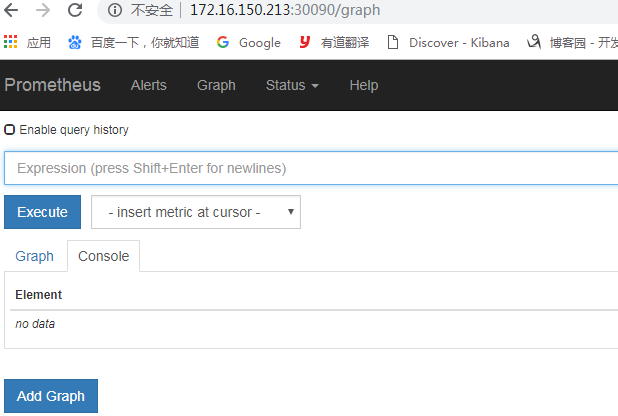
4.部署metrics适配器(将prometheus数据转换为k8s可以识别的数据)
[root@k8s-node01 kube-state-metrics]# grep image: ./* ./kube-state-metrics-deployment.yaml: image: quay.io/coreos/kube-state-metrics:v1.3.0 ./kube-state-metrics-deployment.yaml: image: k8s.gcr.io/addon-resizer:1.7 [root@k8s-node02 ~]# docker pull registry.cn-hangzhou.aliyuncs.com/ccgg/addon-resizer:1.7 [root@k8s-node01 kube-state-metrics]# vim kube-state-metrics-deployment.yaml #修改镜像地址 [root@k8s-node01 kube-state-metrics]# kubectl apply -f kube-state-metrics-deployment.yaml deployment.extensions "kube-state-metrics" configured [root@k8s-node01 kube-state-metrics]# kubectl get pod -n k8s-monitor NAME READY STATUS RESTARTS AGE kube-state-metrics-54849b96b4-dmqtk 2/2 Running 0 23s node-exporter-l5zdw 1/1 Running 0 2h node-exporter-vwknx 1/1 Running 0 2h prometheus-0 2/2 Running 0 1h
5.部署k8s-prometheus-adapter(将数据输出为一个API服务)
项目地址:https://github.com/DirectXMan12/k8s-prometheus-adapter
[root@k8s-master01 ~]# cd /etc/kubernetes/pki/ [root@k8s-master01 pki]#(umask 077; openssl genrsa -out serving.key 2048) [root@k8s-master01 pki]#openssl req -new -key serving.key -out serving.csr -subj "/CN=serving" #CN必须为serving [root@k8s-master01 pki]#openssl x509 -req -in serving.csr -CA ./ca.crt -CAkey ./ca.key -CAcreateserial -out serving.crt -days 3650 [root@k8s-master01 pki]# kubectl create secret generic cm-adapter-serving-certs --from-file=serving.crt=./serving.crt --from-file=serving.key=./serving.key -n k8s-monitor #证书名称必须为cm-adapter-serving-certs [root@k8s-master01 pki]#kubectl get secret -n k8s-monitor [root@k8s-master01 pki]# cd [root@k8s-node01 ~]# git clone https://github.com/DirectXMan12/k8s-prometheus-adapter.git [root@k8s-node01 ~]# cd k8s-prometheus-adapter/deploy/manifests/ [root@k8s-node01 manifests]# grep namespace: ./* #处理role-binding之外的namespace的名称改为k8s-monitor [root@k8s-node01 manifests]# grep image: ./* #镜像不需要下载 [root@k8s-node01 ~]# sed -i 's/namespace\: custom-metrics/namespace\: k8s-monitor/g' ./* #rolebinding的不要替换 [root@k8s-node01 ~]# kubectl apply -f ./ [root@k8s-node01 ~]# kubectl get pod -n k8s-monitor [root@k8s-node01 ~]#kubectl get svc -n k8s-monitor kubectl api-versions |grep custom
第四章、部署prometheus+grafana
[root@k8s-master01 ~]# wget https://raw.githubusercontent.com/kubernetes-retired/heapster/master/deploy/kube-config/influxdb/grafana.yaml #找不到grafana的yaml文件,所以到heapster里面掏了一个下来用用 [root@k8s-master01 ~]#egrep -i "influxdb|namespace|nodeport" grafana.yaml #注释掉influxdb环境变量,修改namespace及port类型 [root@k8s-master01 ~]#kubectl apply -f grafana.yaml [root@k8s-master01 ~]#kubectl get svc -n k8s-monitor [root@k8s-master01 ~]#kubectl get pod -n k8s-monitor
登录grafana,并修改数据源

配置数据源
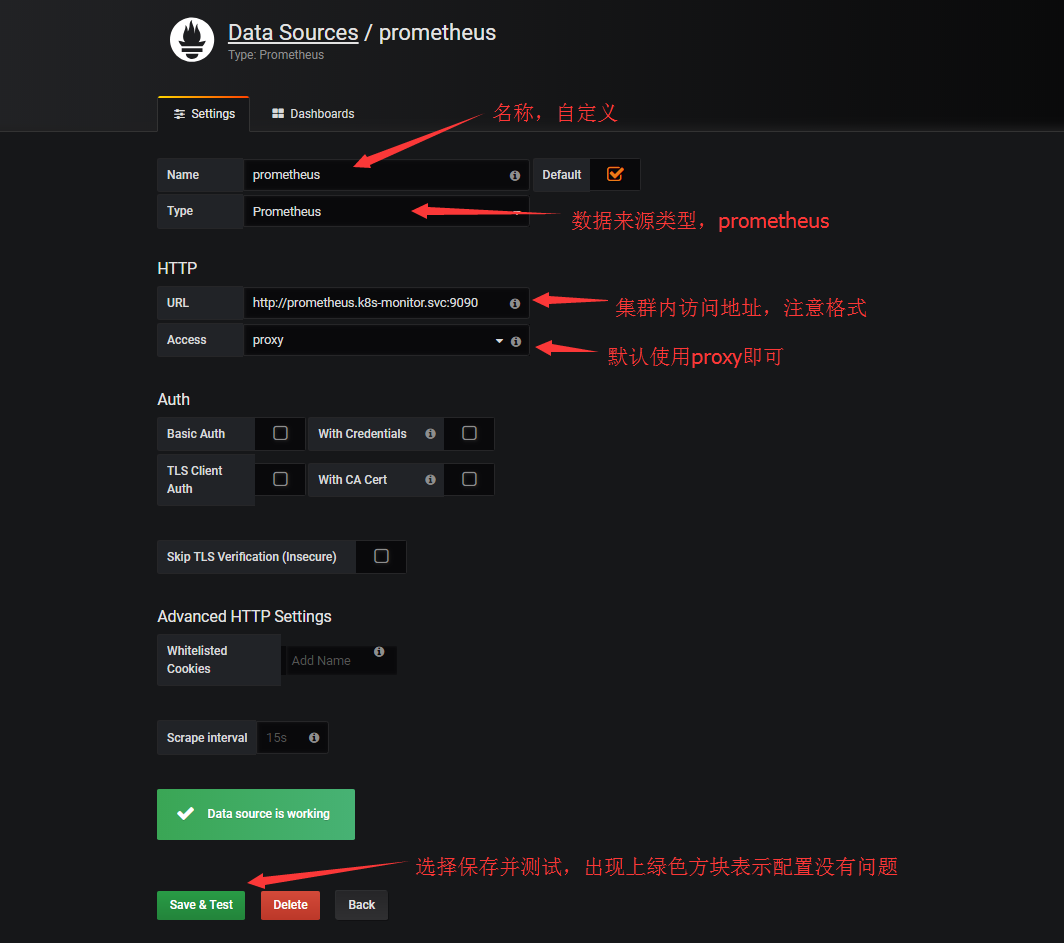
点击右侧的Dashborads,可以导入grafana自带的prometheus的模板

回到home下,下拉选择对应的模板查看数据
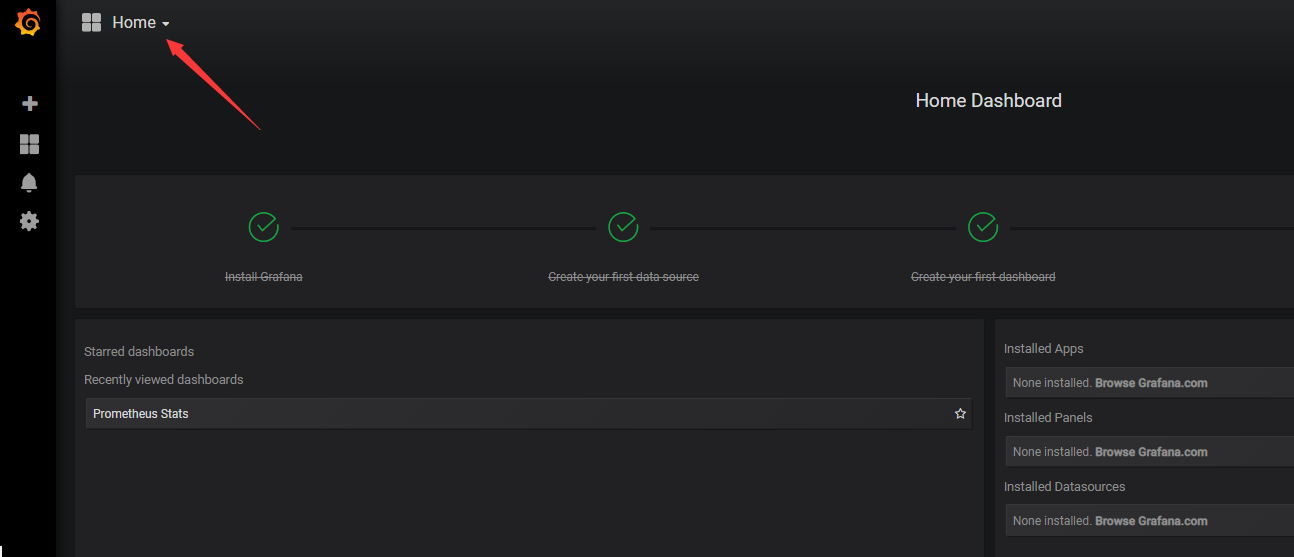
例如:
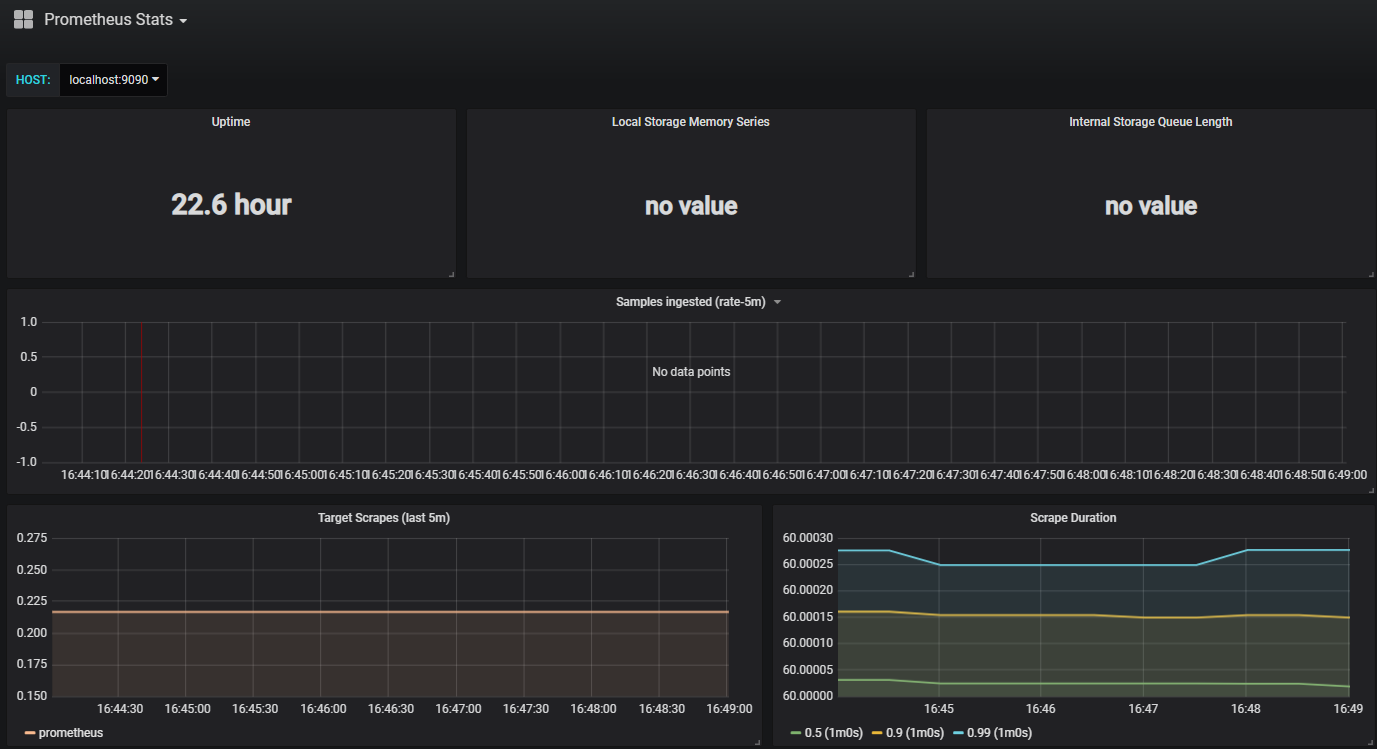 但是,grafana自带的模板和数据有些不匹配,我们可以去grafana官网去下载应用于k8s使用的模板,地址为:https://grafana.com/dashboards
但是,grafana自带的模板和数据有些不匹配,我们可以去grafana官网去下载应用于k8s使用的模板,地址为:https://grafana.com/dashboards
访问grafana官网搜索k8s相关模板,有时搜索框点击没有反应,可以直接在URL后面加上搜索内容即可
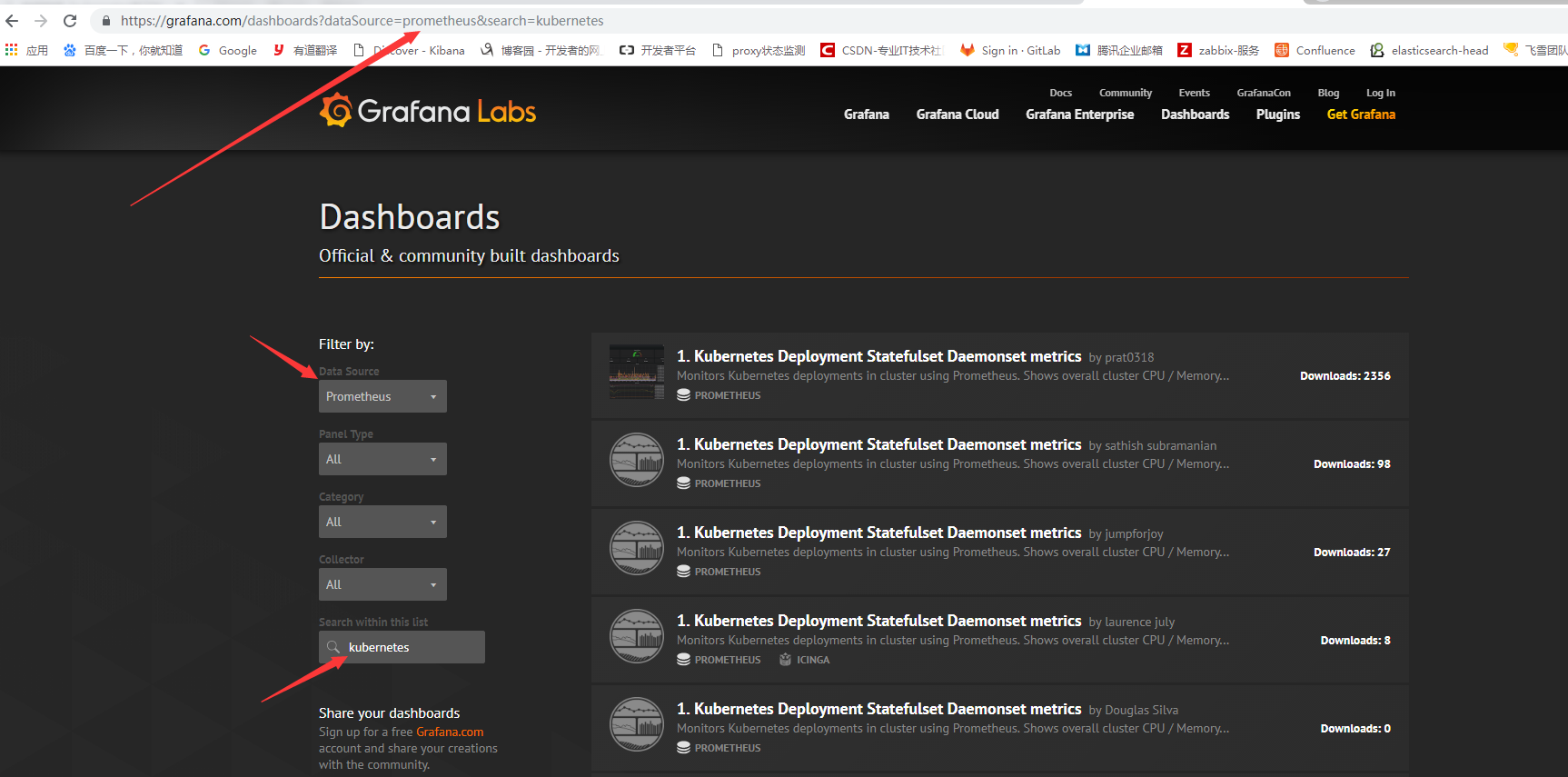
我们选择kubernetes cluster(prometheus)作为测试
 点击需要下载的模板,并下载json文件
点击需要下载的模板,并下载json文件
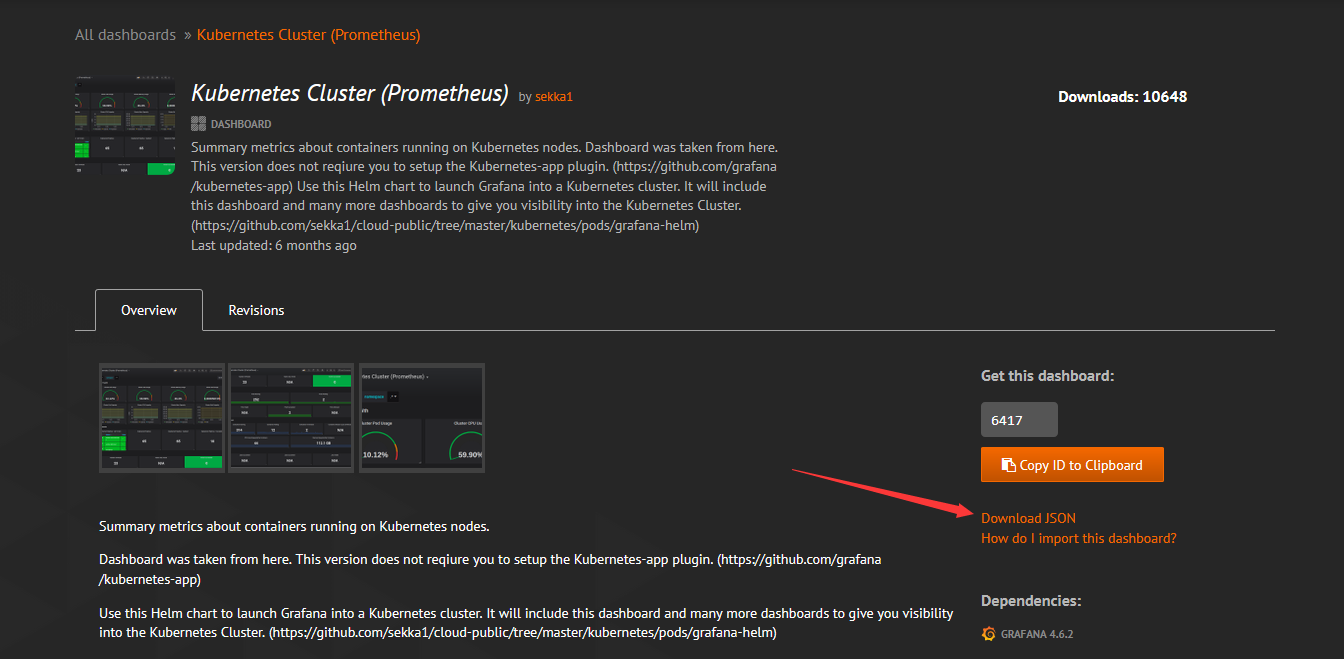
下载完成后,导入文件
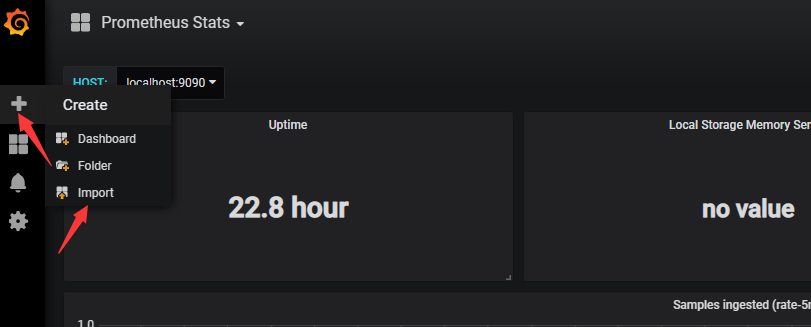
选择上传文件
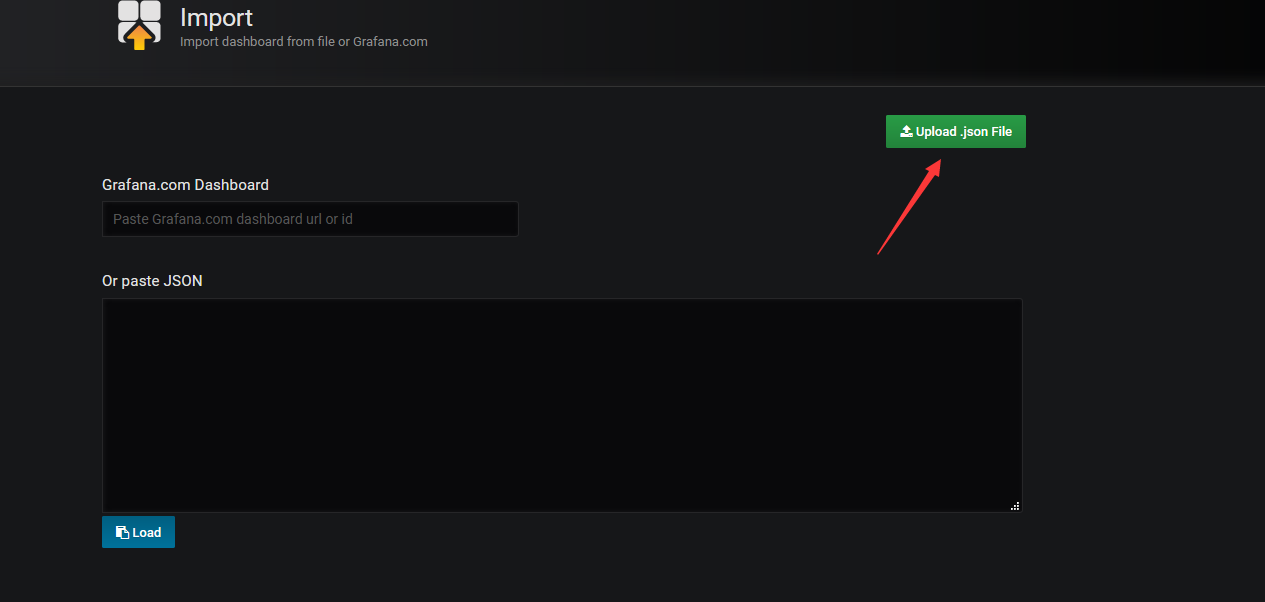
导入后选择数据源
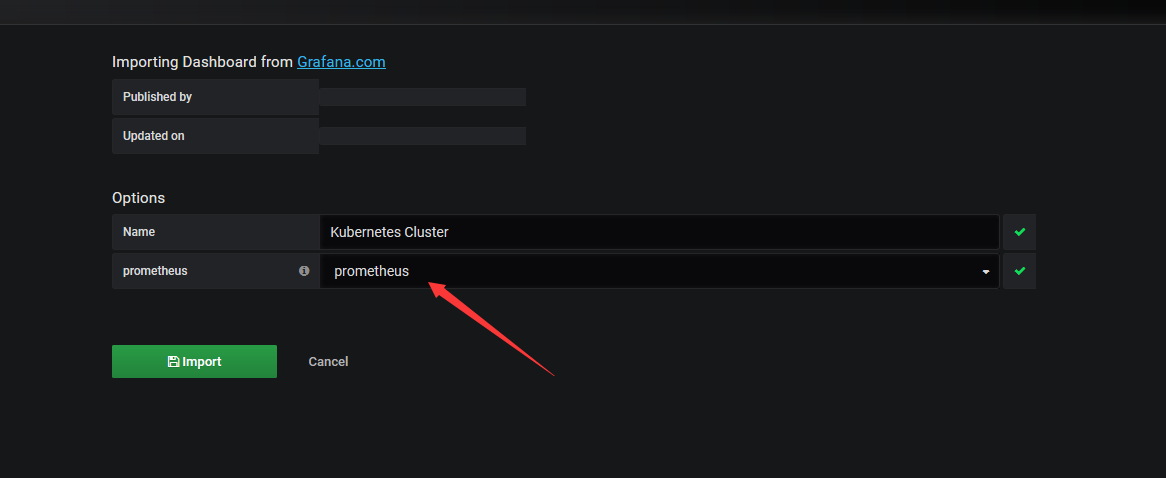
导入后展示的界面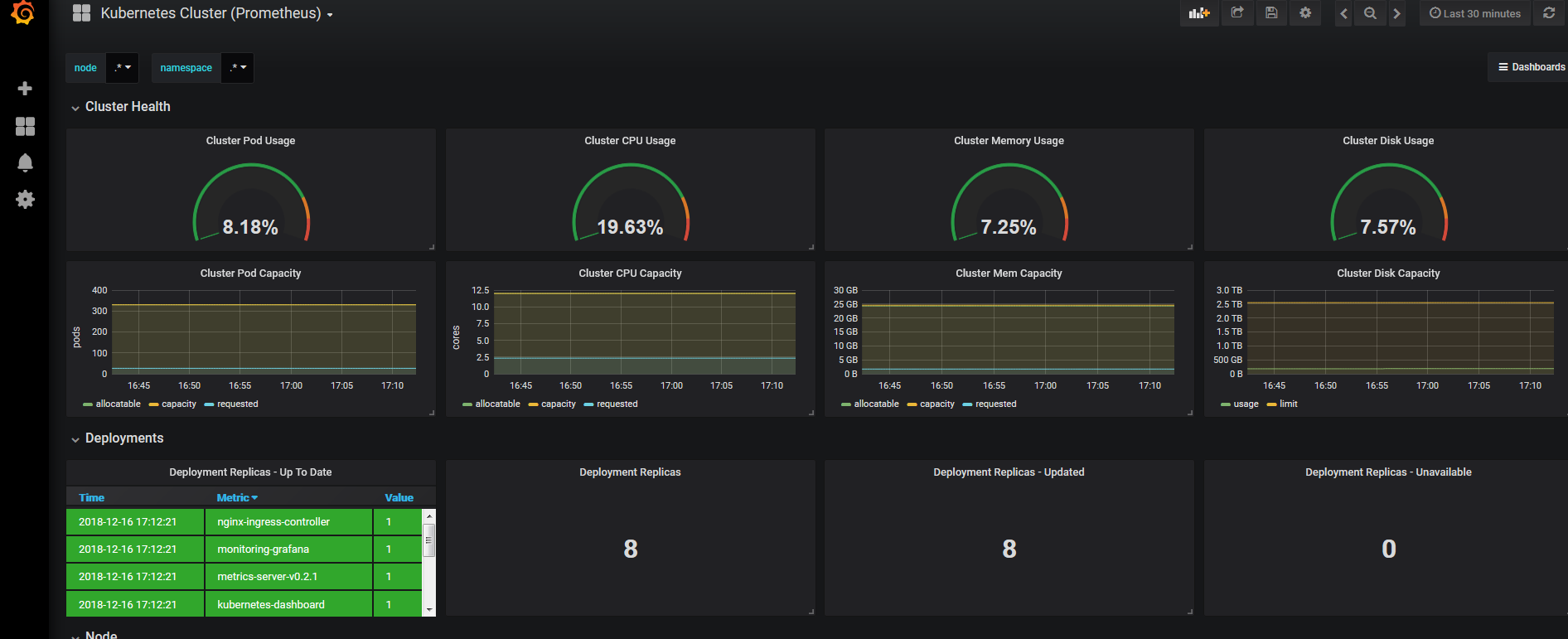
第五章、实现HPA
1、使用v1版本测试
[root@k8s-master01 alertmanager]# kubectl api-versions |grep autoscaling autoscaling/v1 autoscaling/v2beta1 [root@k8s-master01 manifests]# cat deploy-demon.yaml apiVersion: v1 kind: Service metadata: name: myapp namespace: default spec: selector: app: myapp type: NodePort ports: - name: http port: 80 targetPort: 80 nodePort: 32222 --- apiVersion: apps/v1 kind: Deployment metadata: name: myapp-deploy spec: replicas: 2 selector: matchLabels: app: myapp template: metadata: labels: app: myapp spec: containers: - name: myapp image: ikubernetes/myapp:v2 ports: - name: httpd containerPort: 80 resources: requests: memory: "64Mi" cpu: "100m" limits: memory: "128Mi" cpu: "200m" [root@k8s-master01 manifests]# kubectl get svc NAME TYPE CLUSTER-IP EXTERNAL-IP PORT(S) AGE kubernetes ClusterIP 10.96.0.1 <none> 443/TCP 47d my-nginx NodePort 10.104.13.148 <none> 80:32008/TCP 19d myapp NodePort 10.100.76.180 <none> 80:32222/TCP 16s tomcat ClusterIP 10.106.222.72 <none> 8080/TCP,8009/TCP 19d [root@k8s-master01 manifests]# kubectl get pod NAME READY STATUS RESTARTS AGE myapp-deploy-5db497dbfb-h7zcb 1/1 Running 0 16s myapp-deploy-5db497dbfb-tvsf5 1/1 Running 0 16s
测试
[root@k8s-master01 manifests]# kubectl autoscale deployment myapp-deploy --min=1 --max=8 --cpu-percent=60 deployment.apps "myapp-deploy" autoscaled [root@k8s-master01 manifests]# kubectl get hpa NAME REFERENCE TARGETS MINPODS MAXPODS REPLICAS AGE myapp-deploy Deployment/myapp-deploy <unknown>/60% 1 8 0 22s [root@k8s-master01 pod-dir]# yum install http-tools -y [root@k8s-master01 pod-dir]# ab -c 1000 -n 5000000 http://172.16.150.213:32222/index.html [root@k8s-master01 ~]# kubectl describe hpa Name: myapp-deploy Namespace: default Labels: <none> Annotations: <none> CreationTimestamp: Sun, 16 Dec 2018 20:34:41 +0800 Reference: Deployment/myapp-deploy Metrics: ( current / target ) resource cpu on pods (as a percentage of request): 178% (178m) / 60% Min replicas: 1 Max replicas: 8 Conditions: Type Status Reason Message ---- ------ ------ ------- AbleToScale False BackoffBoth the time since the previous scale is still within both the downscale and upscale forbidden windows ScalingActive True ValidMetricFound the HPA was able to successfully calculate a replica count from cpu resource utilization (percentage of request) ScalingLimited True ScaleUpLimit the desired replica count is increasing faster than the maximum scale rate Events: Type Reason Age From Message ---- ------ ---- ---- ------- Normal SuccessfulRescale 19m horizontal-pod-autoscaler New size: 1; reason: All metrics below target Normal SuccessfulRescale 2m horizontal-pod-autoscaler New size: 2; reason: cpu resource utilization (percentage of request) above target [root@k8s-master01 ~]# kubectl get pod NAME READY STATUS RESTARTS AGE myapp-deploy-5db497dbfb-6kssf 1/1 Running 0 2m myapp-deploy-5db497dbfb-h7zcb 1/1 Running 0 24m [root@k8s-master01 ~]# kubectl get hpa NAME REFERENCE TARGETS MINPODS MAXPODS REPLICAS AGE myapp-deploy Deployment/myapp-deploy 178%/60% 1 8 2 20m
2、使用v2beat1
[root@k8s-master01 pod-dir]# cat hpa-demo.yaml apiVersion: autoscaling/v2beta1 kind: HorizontalPodAutoscaler metadata: name: myapp-hpa-v2 spec: scaleTargetRef: apiVersion: apps/v1 kind: Deployment name: myapp-deploy minReplicas: 1 maxReplicas: 10 metrics: - type: Resource resource: name: cpu targetAverageUtilization: 55 - type: Resource resource: name: memory targetAverageValue: 100Mi [root@k8s-master01 pod-dir]# kubectl delete hpa myapp-deploy horizontalpodautoscaler.autoscaling "myapp-deploy" deleted [root@k8s-master01 pod-dir]# kubectl apply -f hpa-demo.yaml horizontalpodautoscaler.autoscaling "myapp-hpa-v2" created [root@k8s-master01 pod-dir]# kubectl get hpa NAME REFERENCE TARGETS MINPODS MAXPODS REPLICAS AGE myapp-hpa-v2 Deployment/myapp-deploy <unknown>/100Mi, <unknown>/55% 1 10 0 6s
测试
[root@k8s-master01 ~]# kubectl describe hpa
Name: myapp-hpa-v2
Namespace: default
Labels: <none>
Annotations: kubectl.kubernetes.io/last-applied-configuration={"apiVersion":"autoscaling/v2beta1","kind":"HorizontalPodAutoscaler","metadata":{"annotations":{},"name":"myapp-hpa-v2","namespace":"default"},"spec":{...
CreationTimestamp: Sun, 16 Dec 2018 21:07:25 +0800
Reference: Deployment/myapp-deploy
Metrics: ( current / target )
resource memory on pods: 1765376 / 100Mi
resource cpu on pods (as a percentage of request): 200% (200m) / 55%
Min replicas: 1
Max replicas: 10
Conditions:
Type Status Reason Message
---- ------ ------ -------
AbleToScale True SucceededRescale the HPA controller was able to update the target scale to 4
ScalingActive True ValidMetricFound the HPA was able to successfully calculate a replica count from cpu resource utilization (percentage of request)
ScalingLimited False DesiredWithinRange the desired count is within the acceptable range
Events:
Type Reason Age From Message
---- ------ ---- ---- -------
Normal SuccessfulRescale 18s horizontal-pod-autoscaler New size: 4; reason: cpu resource utilization (percentage of request) above target
[root@k8s-master01 ~]# kubectl get pod
NAME READY STATUS RESTARTS AGE
myapp-deploy-5db497dbfb-5n885 1/1 Running 0 26s
myapp-deploy-5db497dbfb-h7zcb 1/1 Running 0 40m
myapp-deploy-5db497dbfb-z2tqd 1/1 Running 0 26s
myapp-deploy-5db497dbfb-zkjhw 1/1 Running 0 26s
[root@k8s-master01 ~]# kubectl describe hpa
Name: myapp-hpa-v2
Namespace: default
Labels: <none>
Annotations: kubectl.kubernetes.io/last-applied-configuration={"apiVersion":"autoscaling/v2beta1","kind":"HorizontalPodAutoscaler","metadata":{"annotations":{},"name":"myapp-hpa-v2","namespace":"default"},"spec":{...
CreationTimestamp: Sun, 16 Dec 2018 21:07:25 +0800
Reference: Deployment/myapp-deploy
Metrics: ( current / target )
resource memory on pods: 1765376 / 100Mi
resource cpu on pods (as a percentage of request): 0% (0) / 55%
Min replicas: 1
Max replicas: 10
Conditions:
Type Status Reason Message
---- ------ ------ -------
AbleToScale False BackoffBoth the time since the previous scale is still within both the downscale and upscale forbidden windows
ScalingActive True ValidMetricFound the HPA was able to successfully calculate a replica count from memory resource
ScalingLimited False DesiredWithinRange the desired count is within the acceptable range
Events:
Type Reason Age From Message
---- ------ ---- ---- -------
Normal SuccessfulRescale 6m horizontal-pod-autoscaler New size: 4; reason: cpu resource utilization (percentage of request) above target
Normal SuccessfulRescale 34s horizontal-pod-autoscaler New size: 1; reason: All metrics below target
[root@k8s-master01 ~]# kubectl get pod
NAME READY STATUS RESTARTS AGE
myapp-deploy-5db497dbfb-h7zcb 1/1 Running 0 46m3.使用v2beat1测试自定义选项
[root@k8s-master01 pod-dir]# cat ../deploy-demon-metrics.yaml
apiVersion: v1
kind: Service
metadata:
name: myapp
namespace: default
spec:
selector:
app: myapp
type: NodePort
ports:
- name: http
port: 80
targetPort: 80
nodePort: 32222
---
apiVersion: apps/v1
kind: Deployment
metadata:
name: myapp-deploy
spec:
replicas: 2
selector:
matchLabels:
app: myapp
template:
metadata:
labels:
app: myapp
spec:
containers:
- name: myapp
image: ikubernetes/metrics-app #测试镜像
ports:
- name: httpd
containerPort: 80
[root@k8s-master01 pod-dir]# kubectl apply -f deploy-demon-metrics.yaml
[root@k8s-master01 pod-dir]# cat hpa-custom.yaml
apiVersion: autoscaling/v2beta1
kind: HorizontalPodAutoscaler
metadata:
name: myapp-hpa-v2
spec:
scaleTargetRef:
apiVersion: apps/v1
kind: Deployment
name: myapp-deploy
minReplicas: 1
maxReplicas: 10
metrics:
- type: Pods #注意类型
pods:
metricName: http_requests #容器中自定义的参数
targetAverageValue: 800m #m表示个数,即800个并发数
[root@k8s-master01 pod-dir]# kubectl apply -f hpa-custom.yaml
[root@k8s-master01 pod-dir]# kubectl describe hpa myapp-hpa-v2
Name: myapp-hpa-v2
Namespace: default
Labels: <none>
Annotations: kubectl.kubernetes.io/last-applied-configuration={"apiVersion":"autoscaling/v2beta1","ks":{},"name":"myapp-hpa-v2","namespace":"default"},"spec":{...
CreationTimestamp: Sun, 16 Dec 2018 22:09:32 +0800
Reference: Deployment/myapp-deploy
Metrics: ( current / target )
"http_requests" on pods: <unknown> / 800m
Min replicas: 1
Max replicas: 10
Events: <none>
[root@k8s-master01 pod-dir]# kubectl get hpa
NAME REFERENCE TARGETS MINPODS MAXPODS REPLICAS AGE
myapp-hpa-v2 Deployment/myapp-deploy <unknown>/800m 1 10 2 5m看完上述内容,你们对Kubernetes的资源指标API及自定义指标API是什么有进一步的了解吗?如果还想了解更多知识或者相关内容,请关注亿速云行业资讯频道,感谢大家的支持。
免责声明:本站发布的内容(图片、视频和文字)以原创、转载和分享为主,文章观点不代表本网站立场,如果涉及侵权请联系站长邮箱:is@yisu.com进行举报,并提供相关证据,一经查实,将立刻删除涉嫌侵权内容。